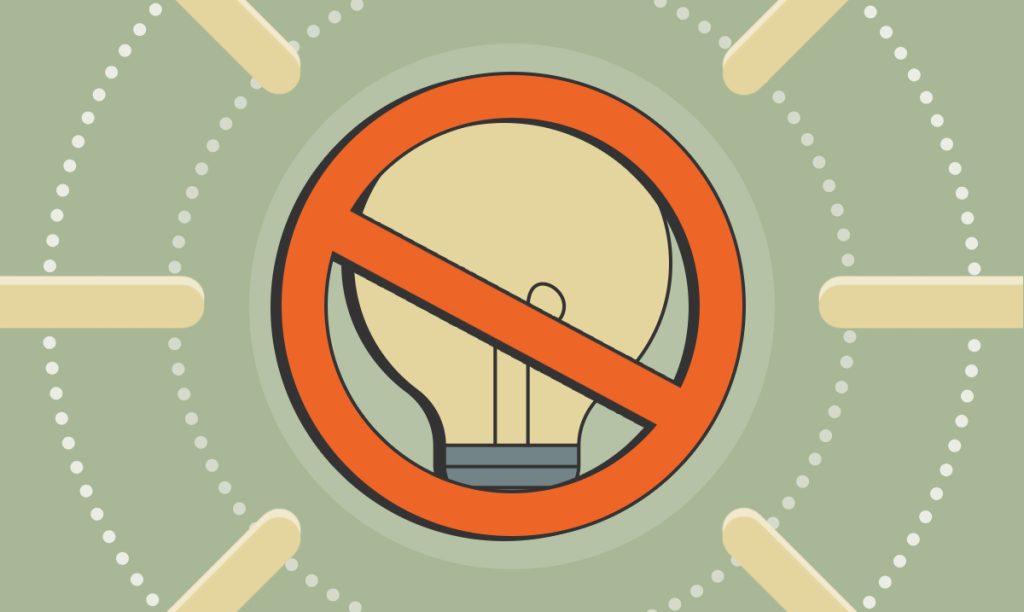So a project can feel totally wrapped up. The final files got delivered, the last invoice got paid, everyone did the polite “great working withyou ...
I Want to Start a Business But Have No Ideas
Written by: Carolyn Young
Carolyn Young is a business writer who focuses on entrepreneurial concepts and the business formation. She has over 25 years of experience in business roles, and has authored several entrepreneurship textbooks.
Published on August 7, 2024

What to do if you’re itching to start a business, but that perfect idea just doesn’t come to mind? Luckily for you, we have an answer (or rather — multiple ones)! We’ve consulted with a bunch of successful entrepreneurs and compiled their advice and suggestions for business ideas that can be profitable in 2024.
1. Building a Successful Business Without Chasing “Great Ideas”
Having started three businesses in my career, I came to the conclusion that a great idea is all about vanity.
As entrepreneurs, we’ve all dreamed of THE idea, the perfect one, that will change the world while making us rich at the same time.
The truth is, a great business doesn’t need a great idea. It needs laser focus, execution, and persistence.
If you are thinking of starting a business, here is what I recommend — take an industry that’s doing well with a target audience that can pay.
Explore the field and choose a business you can model yours after, add your personal brand to it, and execute better.
This is your great idea.
Domenico Trimboli, business owner of domenicotrimboli.com
2. Discovering Your Business Niche and Embracing Sustainability
Rule one: Stick to what you love and know. It’s way easier to thrive when you’re into what you’re doing. Then, snoop around the market. Who’s buying? What do they want? Start small, get feedback, tweak, repeat. Less risk, more learning. And for 2024, think green. Eco-friendly stuff is big — like sustainable packaging or energy-saving gadgets.
Bottom line: Find a gap, fill it with something cool, and stay nimble.
That’s your 2024 business playbook.
Nathan Jacobs, senior researcher at The Money Mongers
3. Identifying a Pain Point and Venturing into Green Real Estate
Don’t try to build the next unicorn overnight. Begin by identifying a specific pain point people experience and offer a solution through a niche product or service. This allows you to validate your idea, build traction, and iterate quickly based on market feedback. Remember, success is rarely linear. Be prepared to adapt your strategy and embrace the unexpected.
For a profitable business idea for 2024, I believe that investing in sustainable and eco-friendly properties will continue to be a lucrative opportunity. With the increasing focus on environmental sustainability and the demand for energy-efficient homes, there is a growing market for green real estate. This can involve renovating existing properties to make them more energy-efficient, investing in sustainable development projects, or even specializing in eco-friendly vacation rentals.
Chris McGuire, founder of Real Estate Exam Ninja
4. Harnessing VR and AR for Personalized Travel Experiences
If someone approached me for business advice, my go-to recommendation would be to identify a niche in which they have a unique advantage or insight and that has a high demand and low supply. I would advise them to start by researching their niche and competitors by using online tools, such as Google Trends, Keyword Planner, or SimilarWeb. I would also advise them to follow the blue ocean strategy, which involves creating a new and uncontested market space by offering a value proposition that is different and superior to the existing alternatives.
A business idea that I believe will be profitable in 2024 is a service that provides personalized and immersive travel experiences using virtual reality (VR) and augmented reality (AR) technologies. The service would use VR and AR devices and applications, such as Oculus, Google Cardboard, or Pokemon Go, to create and deliver realistic and interactive simulations of various destinations, cultures, and activities. The service would appeal to both travelers and non-travelers by providing them with more accessibility, affordability, and diversity.
James Heartquist, real estate buyer & owner of We Buy Houses Arizona
5. Launching a Business by Solving Local Problems
My go-to recommendation for anyone starting a business is to focus first on solving a problem or need in your community.
When I launched Crossroads Foundation Repair over a decade ago, I saw issues that local homeowners faced with aging infrastructure below ground. By zeroing in on basement waterproofing and foundation stabilization, I could provide real solutions.
A few pieces of advice I like to share are:
1. Start small and don’t overextend yourself
2. Listen closely to your customers for challenges they have that you may be able to address
3. Build quality word-of-mouth by delivering excellent results.
As for 2024, with more people working remotely, I believe opportunities lie in affordable co-working spaces outside major cities. Providing people with comfortable places to focus, alongside the prospect of valued networking, I believe could be worth something.
Overall, I would say identify genuine needs and don’t be afraid to get your hands dirty — that hands-on approach is what sets me apart in this industry.
Kyle Leman, co-owner of Crossroads Foundation Repair
6. Focus on Building a Solid Sales Strategy
Entrepreneurialism is all too often romanticised and portrayed as some kind of magical process reserved for those exclusive few who possess the key to success. My advice to aspiring entrepreneurs would be to ensure that no matter what, you have a crystal clear and robust route to market for your product or service. Put simply — be very sure of your sales process and exactly how you are going to consistently obtain new customers.
In essence, this is what entrepreneurialism (especially in the early days) amounts to — Can you get new customers consistently and at scale? Without a resounding yes in response to that question, you are throwing caution to the wind and exposing the future of your business to chance factors before you’ve even begun.
Spend 90% or more of your time developing and falsifying strategy in this area, then carry out your plan with unwavering commitment.
Dan Hanley, director of Octane Accountants
7. Making the World a Better Place
According to every study I’ve seen in researching my four books on the subject, consumers are voting with their dollars to support businesses that are using their products and services to make the world better — and many of those types of businesses are easy and inexpensive to start. I believe that startups should keep their overhead low, too.
A few among hundreds of possibilities:
- Grow and sell organic sprouts to restaurants and natural foods stores
- Offer window caulking and home tightening services in conjunction with the local senior center (which could get a grant to pay you)
- Start a training program to teach entrepreneurial skills to inner-city kids of color
Shel Horowitz, The TransformpreneurSM at Frugal Fun/Frugal Marketing
8. Start Small, Start Now
As a founder navigating ToolTester’s rapid ascent reviewing web tools from bootstrap passion project to internationally trusted discovery platform, my advice for aspiring entrepreneurs boils down to one iterative mantra — start small, but start now.
Essentially, avoid indulging vanities around precision or polish, which hinders your progress. Building in public also invites contributors to shape better solutions together more than any solo genius ever could.
Robert Brandl, founder & CEO of Tool Tester and Email Tool Tester
9. Create Meaningful Connections
My advice for anyone who wants to start a business in 2024 or beyond is that any business can have a logo and a product, but when a consumer can turn to a company and know their purchases say something about who they are and what matters to them, it falls into a different category. When you connect with them on that level, you are able to tap into their world.
Suzanne Sachs, president of VintageDiamondRing.com
10. Leveraging Podcasting and Financial Realism
I would recommend having a clear, purpose-driven business plan. Identify the purpose of your business, as customers are more attracted to businesses that contribute to the community and align with their needs. If my advice aligns with your business idea, then go for it. Also, be realistic about your finances from the outset; get them in order.
If you have skills and expertise, I would suggest not hesitating to start your podcast. It is emerging as a popular source of entertainment and information for people. You can select a niche that is relevant to your experience and create high-quality content to attract affiliates and generate revenue.
James Owen, co-founder & director of Click Intelligence
11. Embracing a Profit-First Mindset & AI Businesses
Look for business opportunities from a profit-first perspective. Too many entrepreneurs waste their time pursuing passions because someone told them being highly motivated would eventually lead to results. I couldn’t disagree more.
Great businesses come from innovating, looking for gaps, and positioning yourself in the path of money. The millionaire next door probably owns something boring, like a porta-potty business or a construction company. If you follow a profit-first mindset, you will stay motivated because money creates options in your life, and having options will make you happy. It’s harder to be happy chasing your passion while being broke because you didn’t consider the economics of your business.
In 2024, for Americans, I’m bullish on personal security, home security, and anything having to do with AI.
Veronica Hanson, global nomad entrepreneur at Nomad Veronica LLC
12. Doing Affiliate Marketing Before Starting Your Business
You can explore affiliate marketing in multiple niches and industries to decide which businesses you would like to start. For instance, you can create affiliate websites in niches like e-commerce, eLearning, and digital tools. This will help you understand these industries and get a first-hand look at the marketing dynamics and consumer trends in different niches. You can use this knowledge to decide which business is the best fit for your particular skills and level of interest.
Farhan Siraj, CEO of Osha Outreach Courses
13. Embracing Imperfection & AI Consulting
For budding entrepreneurs, too often, the aim for perfection leads to paralysis. We think we have to have every aspect of our business plan fully baked to perfection in order to start. That hardly ever happens. My advice is don’t discard any ideas off the bat. That’ll just add barriers or negatives to your progress.
Get all your ideas out somewhere — on paper, via brainstorming, on Post-it notes, wherever. Once all the ideas are out, you can start to piece together the really good ones and discard the ones you don’t think are practical.
One business idea for 2024: AI Consultant. Everyone wants to know and understand AI better and, importantly, what it means for their business. Becoming an AI expert isn’t something that would look too shabby to prospective clients.
Mike Sprouse, owner & founder of The Sprouse Group
14. Unique Solutions & Green 3D Printing
In my experience, the key to business success is solving a real problem with a unique solution. It’s crucial to validate your idea with market research and adapt quickly based on feedback. A
strong, adaptable team and a focus on customer experience make all the difference.
For 2024, I see eco-friendly 3D printing services as a profitable venture. They tap into the growing demand for sustainable solutions in the tech space. Hope this sparks some ideas!
Scott Hamill, editor at 3DSourced
15. Leveraging Contacts and Events
If you have found a solution to a problem and want to bring it to market, congratulations! You’ve identified the hardest part. Next, you need to get it to market, but to do that, you need to share your ideas.
When starting a new business, the first thing you should do is go through your contacts and see if you have anyone in your network who could either help you get started or would be your first customer. Your greatest asset is your network.
If you go through and find your contacts aren’t a great fit, then it’s time to dress up and get to networking. Join a local BNI chapter or find a networking event near you. Your Local Chamber of Commerce should have a list of events coming up. Attend an event, start shaking hands, and set up one-to-ones.
Derek Couts, founder & CEO of B.Human
16. Setting up an Exit Strategy
Though it may seem counterintuitive, one of the best steps to take when starting a business is to make sure you set up an exit strategy. Sometimes, it is hard to conceive of the way you are going to leave a business when you have not even started it, but how you plan on exiting your endeavor will determine many of the ways and strategies you implement to run it.
A business that seeks funding must know what it entails to sell the business, pass it down to a family member, go through a liquidation process, or simply close it down, as each of those will require planning in not only how you perform those functions but how you distribute resources while the business is in operation.
By having an exit strategy, you can make sure you operate your business in line with what you will need to do when you leave it and make sure the transition to its next stage will achieve the desired result.
Daniel Kroytor, founder of Tailored Pay
17. Factoring in Taxes
There are many expenses when it comes to operating a business but the one that many do not factor in at the beginning is taxes, but it is critical that you do so before you start. Sometimes, it is difficult to conceive of what you will owe the government when you have not taken in any revenue, but having a plan in place before you start will help prevent unwelcome surprises that can have a damaging effect on your bottom line.
Checking for potential write-offs, looking for tax breaks depending on the region you operate, understanding income and self-employment taxes, and having a full understanding of the regional sales tax is crucial to knowing what you will need to begin your business successfully. In addition, hiring a tax professional is also well-advised. By fully understanding the tax structures and your potential obligations, you will be able to prevent unexpected expenses that could sink your whole operation.
Christy Pyrz, chief marketing officer at Paradigm Peptides
18. Exploring Opportunities with ChatGPT’s Chat Agents
First, get your mind right. The work will be hard. There will be disappointments, and in order to succeed, you’ll need to do work you enjoy and that fills you with purpose. Second, look for opportunities in fields you are already familiar with. Where is your zone of genius? What do you do that you have the most competitive advantage?
If you’re not sure what to do, learn how to build and use chat agents on ChatGPT. So many news outlets, businesses, and consumers are interested in this right now. It’s so early that if you start today, you can make money in months. The best part is you don’t need to know how to code.
Robert Brill, CEO of Brill Media
19. Franchising
Consider franchising — it’s like a shortcut to owning your own business. You get the benefits of owning your own thing and being your own boss, but without suffering through those first years (or longer) of trying to figure out every single thing. There’s still a lot to learn when you’re
starting a franchise location, but you’re also literally given an owner’s manual on how to do everything! And there are so many cool ideas out there to match your interests.
Jenny Young, founder & owner of Brooklyn Robot Foundry
20. Finding a Demand and Minimizing Costs
If you want to start a business, make sure it’s for a product or service that is in demand. Nothing is worse than getting into a business that settles a short-term dilemma but has no room for growth. If it can be accomplished virtually, stay virtual. Finding a physical space easts up the budget faster than anything else. If you can start an online retail store, stay online for as long as possible.
Larry Snider, VP of operations at Casago
21. Building a Nature-Centric Escape in a Digitally Overloaded World
My business advice is to be tough and learn from tough times. Know your plan and your audience, and use online tools for your business. Be ready to change as things change. Keep your costs low and learn from mistakes. Stay true to your values and build a brand that reflects them. Also, don’t forget to focus on self-care because a healthy entrepreneur is a successful one.
For a cool idea in 2024, think about a nature getaway. People need a break from screens. Imagine a place where folks can unplug, chill, and find themselves again. It’s like a vacation to recharge from the busy digital world.
Matthew Smith, operations manager at Ticket Squeeze
22. Innovating in Established Markets
One thing that’s important to keep in mind about business ideas is that not all of them have to revolve around a novel, unique product. You can launch a dynamic business that can do new and interesting things, even in a boring, well-established market. The key is taking a different approach to your branding, online presence, pricing, and labor practices. This has been our approach in the moving industry, and it’s been really effective.
People have been helping others move for thousands of years now; our only new idea was to create a more personal, approachable brand, lean heavily into our online presence, and be as transparent as possible with our pricing.
Nick Valentino, VP of market operations at Bellhop Atlanta Movers
23. Separating Business from Personal Ties
I’ve told a handful of people the same thing: Don’t go into business with friends or family, and make sure you have a solid marketing plan. Things get complicated when doing business with friends or family. The vast majority of the time, it’s best to keep those relationships separate from business. A good marketing strategy is going to help bring in those early customers and sustain them as returning customers. I recommend content marketing in conjunction with social media marketing.
Dustin Sitar, CEO of The Groom Club
24. Launching Your Consulting Business Under $1,000
I started a global branding and digital marketing firm 22 years ago. Setting up any type of online consulting or coaching business on the cheap (under $1,000) is a great idea now because all you need is a website, logo, name, e-mail, business cards, online stationery for proposals and invoices, cell phone and a good idea to get going.
If you want to incorporate, that will add some expense, but all of these activities can be done with little investment until you sign up some clients and choose to spend more.
I recommend NOT spending money on things like fancy brochures, letterhead, business cards, etc. until you know your business is launched.
I would say to put your budget into things that help fill your pipeline with customers. Getting your URL and a website up and running is key. I created online stationery for proposals and invoices, ordered my cards online, and made downloadable materials as leave-behinds for people looking for more information to help me find those reference customers quickly and then use them to get testimonials and referrals.
There will be plenty of opportunities for finance/HR/wellness/fitness and other coaches & consultants in the new normal post-pandemic. The key is to validate the market size while avoiding huge capital expenditures/startup costs.
Paige Arnof-Fenn, founder & CEO of Mavens & Moguls
25. Customized Solutions for Individual Well-being
Mental health services tailored to individuals can be a great business idea that has the potential to skyrocket. Right now, mostly there are either workshops or sessions that target a specific audience, but the option to customize is very limited. Starting a brand that can cater to individuals’ mental health based on their energy levels, symptoms, habits, and lifestyle holds great potential.
Your target can easily be remote workers and office workers, as due to work, stress is considered very normal, but it has negative side effects as well, which shouldn’t be ignored.
Based on these factors, personalized meditation sessions, stress management techniques, therapy, and counselling can be provided.
Jean Christophe Gabler, founder of Yogi Times
26. Prioritizing Content Creation and Personalization
My recommendation for budding entrepreneurs is to focus on content creation over product creation. Most people get completely carried away with the latter: the features, the bells and whistles. But this is not how you sell products. You sell them by creating ungodly amounts of content and building a brand. The earlier you start, the earlier you will see sales. Write a blog post today. Record a YouTube video, however crappy, and then never stop.
As for profitable business ideas — I predict that any kind of business that offers a highly personalized approach will succeed. With the rise of mediocre but infinitely scalable AI solutions, it’s the only way to stand out. You must understand your customer, and you must offer a personal touch. Productized services, a business model touted as the end-all for so long, will likely go away. One-size-fits-all will no longer cut it.
Niels Bohrmann, accountability coach at nielsbohrmann.com
Subscribe to Our Newsletter
and gain insider access to cutting-edge business insights and trends.
Featured Resources

What Happens When a Client Disputes a Project a Year Later?
Published on February 13, 2026
Read Now

How to Manage Multiple Financial Goals at Once
Published on December 31, 2025
Keeping up with several financial goals at the same time can feel like juggling too many things at once. Saving for a home, paying down credit cards ...
Read Now

The Link Building Services E-Commerce Brands Are Relying on in 2026
Published on December 22, 2025
E-commerce link building in 2026 feels calmer than it did a few years ago. Not easier, but calmer. The panic around chasing every new tactic hassett ...
Read Now
Comments